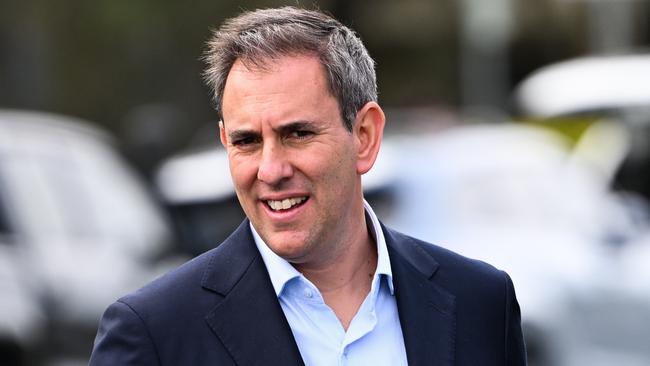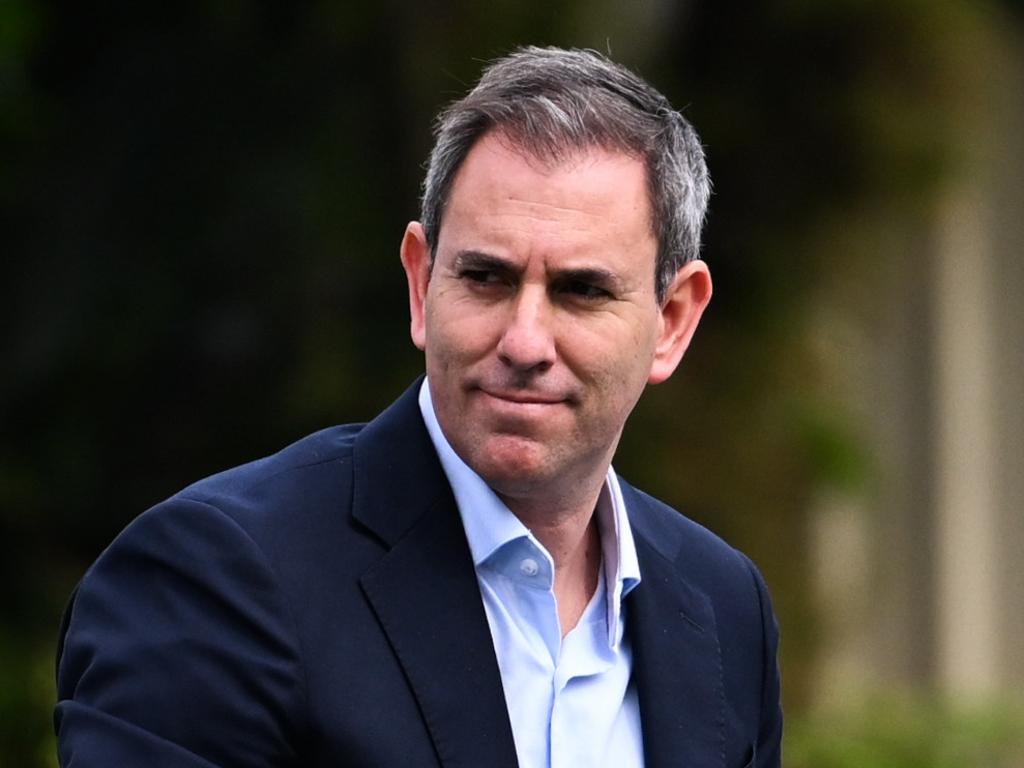Labor’s ‘hidden trap’: Jim Chalmers seeks unrealised political gains
Superannuants have discovered a ‘hidden trap’ in Labor’s planned unrealised capital gains tax, with Miles Hampton saying he faces a hit on the recovering value of assets that booked losses before July 1, when the tax is to begin.

Superannuants have discovered a “hidden trap” in Labor’s planned unrealised capital gains tax, with the former chairman of Forestry Tasmania and MyState bank, Miles Hampton, saying he faces a hit on the recovering value of assets that booked losses before July 1, when the tax is to begin.
The Albanese government is seeking to use its majority election win and the Greens’ depleted status in parliament to ram through a new tax on unrealised capital gains beginning with superannuation funds worth more than $3m, without indexation.
Business leaders from CSL chairman Brian McNamee to Sydney Swans chairman Andrew Pridham, suburban superannuants, financial advisers and academics have criticised Labor’s proposal, saying it would be a disincentive to investment, hit as many as 1.8 million Australians over their working life and spread to other structures and income levels.
The government is relying on the new tax to help plug gaps in its growing budget deficits over the next four years with an estimated $40bn to be collected through the tax over the next decade.
Mr Hampton revealed to The Australian on Wednesday that he would face an “unfair” tax bill because the baseline for assessing whether losses could be carried forward would only begin on July 1. “The taxing of unrealised aggregate self-managed super fund balance gains has some completely unfair consequences,” Mr Hampton said. “Say a self-managed super fund member with a balance above $3m is sitting on a loss on an individual asset and the asset records a gain in the tax year but remains below cost price.
“If their SMSF makes an aggregate unrealised gain, then the member will pay tax on the recovery in the asset value even though they are still out of the money.”
Mr Hampton declined to reveal the size or the sector the assets were in, but confirmed he had an account of $3m that would incur the tax.
Bond University finance professor David Gallagher said the proposal had been badly thought through.
“The tax means you get punished on the cost base as of the date the tax starts. There just shouldn’t be a tax on unrealised gains,” Professor Gallagher said.
“The problem is that we now have a situation where the government is going further into debt and it needs to find tax revenue.
“We do need tax reform but we need takes that don’t attack incentives to invest. This tax attacks those incentives.”
Maitland-based superannuation expert Meg Heffron said she had plenty of clients who would be caught in this “nasty” situation of not being able to carry forward losses made before the tax started.
“I don’t think many people are aware of this hidden trap,” Ms Heffron said.
“It means people will essentially be paying tax on what is a recovery. If you are on a recovering trajectory before July 1 or even July next year, if that’s when the tax starts then you will end up paying tax on that recovery and won’t be able to carry forward that loss (made before the tax starts). It will be nasty.”
She said the new tax was “outrageous” especially given any tax paid on appreciating assets would not be refunded if the asset depreciated.
The Treasurer responded to the concern on Wednesday but did not address the timing of the baseline from which losses could be carried forward.
“Consistent with other elements of the tax system, people will be able to carry forward losses,” Dr Chalmers said.
“I’m not generally stopped in the street about these changes. I’m sure that people broadly recognise that it’s a modest change but it makes a difference to the budget.
“I think it’s good we live in a country where when changes are proposed people have got the ability to express a view about it.”
The tax, known as division 296, whacks an additional 15 per cent on earnings and unrealised capital gains in addition to the existing tax of 15 per cent.
The Greens have been pushing Labor to adopt an even lower account threshold of $2m at which the tax would kick in.
Anthony Albanese, who broke a 2022 election promise not to change the tax treatment of super by seeking to introduce this new tax, has promised he will not bargain with the Greens on its final form.
Asked again on Wednesday whether Labor would reconsider changes to the tax proposal, Dr Chalmers again insisted: “We’re not considering that.”
Members of the leaderless Greens party, who will vote on Thursday for a new leader, did not respond to requests on where they might be willing to bargain.
The Greens want any unrealised gains tax to proceed on the basis that it is indexed and that the threshold begins at $2m.
Modelling shows that lowering the threshold from $3m to $2m would lead to 1,811,952 Australians being stung with the tax before they die.
Last week The Australian revealed that former Labor vice-president and trade union leader Michael Easson was against the new unrealised gains tax and that Labor needed to reconsider it.
One superannuant, who declined to be named due to their prominence as a public figure, suggested to The Australian that there should be a rule allowing superannuants to withdraw money from their fund above the $3m threshold to avoid being subject to the unrealised gains.
“You can’t tell people that you don’t like them having more than $3m in super and at the same time trap it in a structure that has been a mandatory savings structure for 100 years,” the person said.
“Moving the ‘excess’ balances should be permitted and is consistent with the ideology of the tax.
“If the government seeks that no one needs more than $3m in super to live, thus removing the concessional tax – why not permit people to withdraw balances above $3m?
“The reality is that the majority of the very largest super balances are held by people over 65 who will do just that. If you are under 65 the money is trapped for no fault of their own.”
Up to $25bn could be withdrawn from self-managed superannuation funds this year as people race to reduce their account balances.
The Reserve Bank has warned of how policies around superannuation could lead to significant withdrawals and consequently restrict the way such funds invest and make returns.
The Albanese government is yet to explain how the unrealised tax would apply to defined-benefit pensions, such as those owed to some politicians and judges.
Dr Chalmers said on Wednesday: “We did a lot of consultation to make sure that defined benefit was appropriately represented in the changes that we are proposing.”





To join the conversation, please log in. Don't have an account? Register
Join the conversation, you are commenting as Logout